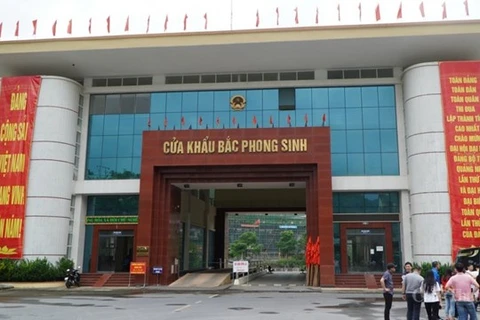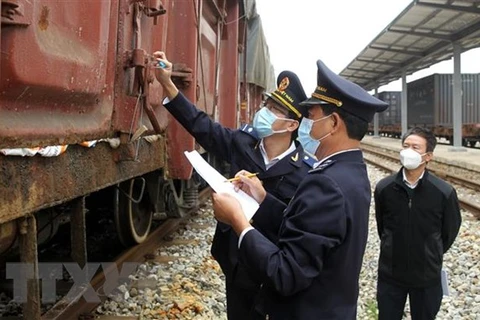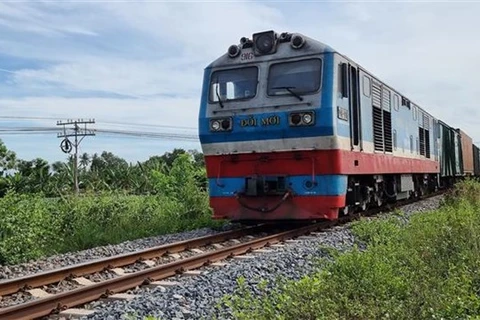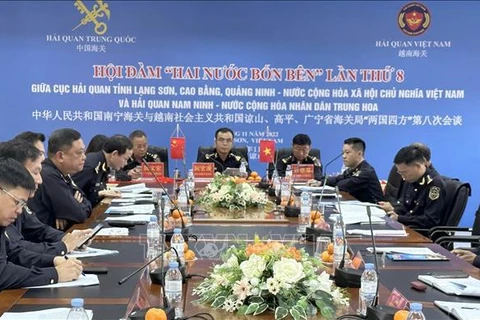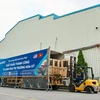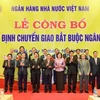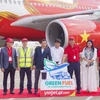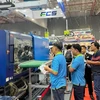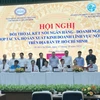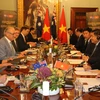 All activities related to the declaration, payment and receipt issuance for seaport fees are conducted via the e-customs system and the portal of Ho Chi Minh's inland waterway port authorities. (Photo: VNA)
All activities related to the declaration, payment and receipt issuance for seaport fees are conducted via the e-customs system and the portal of Ho Chi Minh's inland waterway port authorities. (Photo: VNA) Hanoi (VNA) – The development of international trade and the growth of import-export turnover have required the customs sector to promptly reform so that it could deal with the increasing workload.
Digitalising customs sector
Statistics released by the customs showed that the country’s total import-export turnover reached 545 billion USD in 2020, up 5.4% from the previous year. The number of customs declarations amounted to 13.7 million.
Vietnam’s import-export turnover hit 668 billion USD in 2021, a year-on-year rise of 22.8%, and the number of tackled customs declarations also increased to 14.6 million.
By November 15, preliminary data indicated that the country’s foreign trade turnover was 665 billion USD, with a trade surplus of 8.7 billion USD.
With a prospect of growing trade, the customs sector needs to make greater efforts to improve the business environment and facilitate trade.
Deputy Minister of Finance Nguyen Duc Chi said the global economy in general, and the Vietnamese economy in particular, is recovering in the post-pandemic period. Although the world economy has seen unpredictable fluctuations, the Vietnamese economy has obtained promising achievements.
The Prime Minister issued Decision No. 1163/QD-TTg dated July 13, 2021 on developing domestic trade until 2030 with a vision to 2045, mapping out major orientations for the development of commerce in the coming time, focusing on further improving the domestic investment and business environment; gradually developing domestic trade stably and sustainably; and maintaining domestic trade growth at a higher pace than the country’s gross domestic product (GDP) growth.
It could be said that improving the business and investment environment is one of the key solutions to develop trade in Vietnam.
On that basis, Vietnam has implemented commercial reforms, including the performance of the World Trade Organisation (WTO)’s Trade Facilitation Agreement (TFA), the National Single Window Mechanism and the Customs Development Strategy which has been approved recently and set out specific measures to completely digitalise the customs sector.
Efforts to implement TFA ahead of schedule
According to Mai Xuan Thanh, Deputy General Director of the General Department of Vietnam Customs and Director of the Project Management Unit (PMU), together with the development of trade and the growth of import-export turnover, the customs sector’s workload has been increasing, requiring timely reforms and innovation.
Hence, the customs sector has had to study and apply new management forms with the aim of creating the most favourable conditions for enterprises to abide by the law and at the same time fulfilling the tasks of managing, controlling and preventing increasingly complicated trade frauds amid limited resources.
The government’s reform commitment has been demonstrated by remarkable results and Vietnam has been carrying out commitments in the World Trade Organisation (WTO)’s Trade Facilitation Agreement and is expected to fully observe these commitments by the end of 2024.
The US Agency for International Development (USAID) has funded the Trade Facilitation Programme, a five-year project (2018-2023) aimed at supporting the Government of Vietnam to develop a more attractive business environment for enterprises, traders, and investors. These efforts include simplifying customs procedures and easing congestion at Vietnam’s ports, such as at Cat Lai, the country’s busiest container port. This has become increasingly important as trade rebounds in the post-COVID-19 environment and will strengthen implementation of the World Trade Organisation's Trade Facilitation Agreement (TFA) of which both Vietnam and the US are members.
The Government of Vietnam has tasked the Ministry of Finance’s General Department of Vietnam Customs to coordinate inter-ministerial efforts to streamline customs procedures and specialised inspections. To support these efforts, the programme is working with the General Department of Vietnam Customs to strengthen the capacity of Vietnam's National Trade Facilitation Committee; enhance national and provincial coordination; and facilitate dialogue between customs and the business community.
The programme aims to achieve the following results: harmonised and simplified customs policies and procedures across governmental units; strengthened national-provincial coordination of trade facilitation strategies; strengthened provincial-level implementation and inter-provincial coordination in at least five provinces, and increased capacity of provincial customs officers; and enhanced partnerships between customs and the private sector./.

